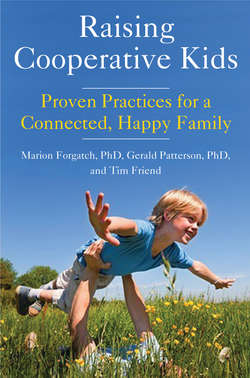Читать книгу Raising Cooperative Kids - Marion S. Forgatch - Страница 23
На сайте Литреса книга снята с продажи.
Enhanced Strategies for Giving Clear Directions
ОглавлениеPrepare yourself. Stop what you're doing and pay full attention to your direction.
Get your child's attention. Say your child's name, get close, use eye contact, use touch (as appropriate).
Say what you want the child to do. Saying what not to do omits the necessary information. “Put your jacket in the closet, now please.” vs. “Don't leave your jacket in the hall.”
Make it short and simple. Use the fewest words possible and make them easy to understand.
Make a statement; don't ask a question. Questions imply choice (e.g., “Pick up your jacket, now please.” vs. “How would you like to pick up your jacket?”)
Pay attention to timing. Give directions at reasonable times (e.g., not five minutes before your child's favorite TV program is finished).
Be calm. When necessary, take time to become calm in face, voice, language, and body posture. Keep negative emotions under control.
Be pleasant, polite, and respectful, but firm. Show that you expect cooperation in a firm yet positive manner (face, voice, language, and body posture). Use the word “please.”
Don't allow discussion. Simply repeat the same clear, short, polite direction. Arguing reinforces noncompliance.
Give one direction at a time. More than one reduces cooperation.
Give your child time to respond. Cooperation means getting started within ten seconds.
Maintain contact. Stand and hold for ten seconds. After that, restate the direction using the same words and neutral-to-positive emotions.
Follow through. When your child complies, praise the behavior with words, smiles, and positive gestures.
Clear directions can have a profound effect on you and your entire family. Most parents require lots of practice to make clear directions a standard habit. It can be shockingly hard. If it were easy, we wouldn't need this book or the years of research it took to figure this out! How you lead as a parent affects the way your child will follow. And, before you can change your child's behavior, you may have to change your own. That's right. We can't expect our children to become cooperative unless we are skilled at being calm, clear, and polite in the face of chaos.
Think about how many steps are involved. First, when you saw the coat on the floor, you had to stifle the almost automatic (and actually quite natural) irritated reaction. If you allow yourself to react with anger, how do you think your child will react? And how will you then respond to that reaction? And then how likely is it that you will have a pleasant evening with your family? And, by the way, has the jacket been hung up? So, whether you like it or not, the first person you have to change is yourself.
In our decades of working with parents—and being parents—we have met few moms and dads who automatically knew how to deal with irritating situations. Our human reaction to a biting mosquito is to swat it. Most of us have no idea how often we go through the day swatting mosquitos. Learning to respond rather than react to life's many irritants is a lesson in self-control that requires practice, practice, and more practice. Automatic negative reactions to pain can be replaced with responses that help you achieve your goals. In the situation above, the goals were a pleasant evening and the coat hung up
Practice giving clear directions that involve simple actions and that can be accomplished in a minute or two—put your shoes away; close the door quietly; or put your backpack in your room now, please. Don't start with cleaning up a catastrophically messy room or washing the dishes from Thanksgiving dinner. Another mistake parents commonly make is to give what we call “stop” directions: “Stop teasing your brother.” “Don't do that.” Instead, provide a direction for an alternative start-up behavior: “Bring in the mail now, please.” Parents who develop a habit of giving clear directions report that this simple step dramatically improves their children's behavior.
